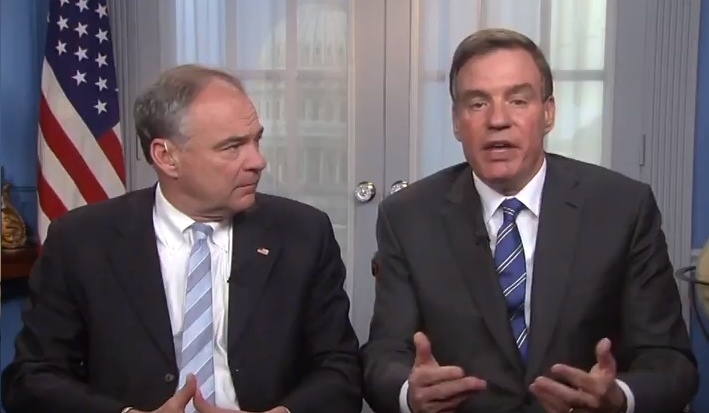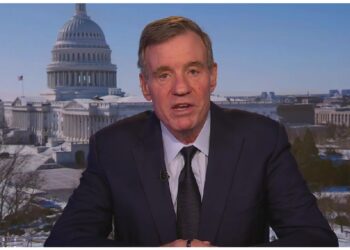See below for video from Sen. Mark Warner’s press availability today, in which he had a bunch of things to say. A few highlights include:
- According to Sen. Warner, we’ve made great progress in this country on COVID-19 and there’s light at the end of the tunnel, but we certainly haven’t defeated the virus on a worldwide basis. The images in India show that we all need to continue to be vigilant.
- He talked about his “bipartisan, bicameral” legislation to invest in the American worker, said we need to invest more in workforce training, as a lot of jobs disappear and don’t come back post-COVID. Right now, our tax accounting/reporting system doesn’t provide incentives for businesses to invest in “human capital,” and that needs to change…with a human capital R&D tax credit.
- On President Biden’s infrastructure plan, Sen. Warner said there’s broad-based support for further infrastructure investment, and one of the tools we need to bring to bear is long-term financing. Right now, we can take advantage of low interest rates. According to Sen. Warner, an infrastructure financing authority with a one-time appropriation of $10 billion could be leveraged into $300 billion in infrastructure investment.
- On access to broadband, Sen. Warner said it’s an “economic necessity, not a ‘nice-to-have’.” We’re already putting money into expanding broadband, and there are new providers (e.g., Elon Musk with a satellite-based system, some of the rural electric cooperatives to provide “last-mile access,” Dominion and other utilities to provide “middle-mile” connectivity). The goal should be “north of 95% coverage” to all Virginia homes “over the next couple years.”
- Sen. Warner said it’s “always better” if we can get a bipartisan solution, including on infrastructure investment. He said he’s open to “breaking this into a variety of projects, or maybe two tranches.” BUT Republicans need to be willing to come forward with how we pay for this investment. Warner believes that creative approaches like an infrastructure financing authority could be one of the ways to help bridge the gap. Again, right now, we have record-low interest rates, so we’d be “almost derelict” not to include some sort of financing authority in the infrastructure bill.
- On sexual harassment and abuse in the military, Sen. Warner said the status quo clearly isn’t working, that other nations have implemented a system of justice that’s coming up with better outcomes, and we’ve got to try something different (e.g., taking the decision away from the chain of command and moving it to the military justice system).
- On unemployment benefits, Sen. Warner said many jobs will not be coming back post-COVID, so we need to get the incentives right to make sure workers get the skills they need post-COVID, for the jobs that will be available. Also need to upgrade technology so we can more finely calibrate unemployment benefits and taper them off as the unemployment drops, etc.
- On the PRO Act, Sen. Warner said he’s proud of his record in support of workers (e.g., $15 minimum wage, perfect voting record on labor issues). He said he supports “the vast majority” of the PRO Act, including the right for workers to organize. So “there’s a lot to like in the PRO Act.” But, he added, “what I want to get to is how can we make some of the areas where I’d like to see some corrections, so that this very expansive piece of legislation could be supported on the floor.” One area he specifically mentioned was “the changing nature of work,” from people staying with companies for many years (and with long-term benefits) to more of a “gig economy” where people have a variety of jobs over time. So, he’s promoting a “fairly dramatic change in our social safety net that says no matter what kind of work you do, starting with that first hour of work, there ought to be benefits attached.” The problem with the PRO Act, Sen. Warner argues, is that it “tries to fit all work into kind of a 20th century, classic W2 employment status,” because we’re not going “to return to a 1980s type of economy.” He said he’s been working closely with the Freelancers Union, National Domestic Workers Alliance, etc. who believe that the portable benefit approach “ought to be part of the new social contract.” So…he looks forward to incorporating these elements so he can support the PRO Act as a whole.






![Saturday News: “Trump’s latest tariff TACO probably won’t make your life more affordable”; “The Epstein Email Cache: 2,300 Messages, Many of Which Mention Trump”; “[MTG] questions if Trump is still the ‘America First’ president”; “Jim Ryan tells all: ‘What did the Governor know, when did he know it?’”](https://bluevirginia.us/wp-content/uploads/2025/11/montage1115.jpg)











